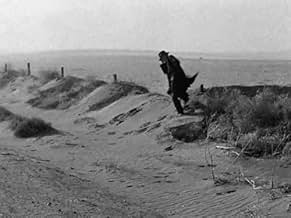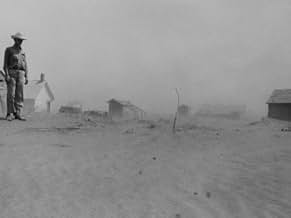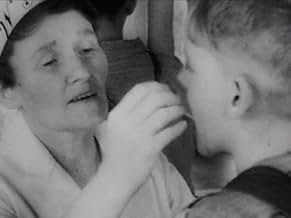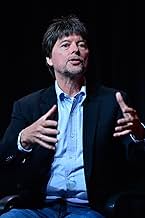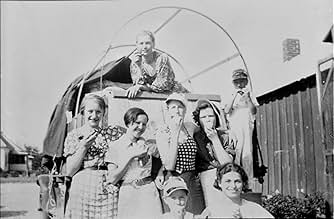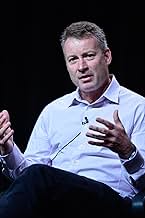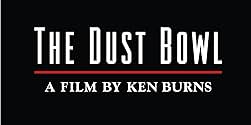IMDb RATING
8.2/10
2.2K
YOUR RATING
A documentary about the 1930s drought of North American prairie farm land, and its consequences during the great depression.A documentary about the 1930s drought of North American prairie farm land, and its consequences during the great depression.A documentary about the 1930s drought of North American prairie farm land, and its consequences during the great depression.
- Nominated for 2 Primetime Emmys
- 2 wins & 5 nominations total
Browse episodes
Featured reviews
Ken Burns really doesn't know how to make a bad documentary, but all of his documentaries have acquired the very familiar style that now borders on the repetitive, and thus borderline boring. "The Dust Bowl" reflects this problem. As is always the case with Burns' documentaries, the images are striking, the interviews moving and insightful, and the narrative - usually - is quite gripping. There's a lot to be learned about the Dust Bowl of the 1930s from this film, and it's generally worth the time. The problem with this film is that no documentary should feel like it takes longer to watch than the event itself. Coming in at nearly 4 hours, this is a bit more narrative about the dust bowl than this particular viewer wants to absorb. After so many great works, Burns' editors seem to have shied away from trimming his films to a length and pace more suitable to the topic. The middle portion of this documentary in film in particular drags on incessantly with tales of one dust storm after another until one is compelled to exclaim "enough - I get it! For Ken Burns fans and those really interested in the dust bowl, this is a worthy watch. For those with a more passing interest, I suggest the PBS documentary from the "American Experience" series.
Once again, Ken Burns has crafted an excellent, informative documentary. This one is about the Dust Bowl. Interviews, photographs, diary entries and footage are used to paint a picture of the time and place, a time when monstrous behemoths of dust could literally blot out the sun.
Most effective are the interviews. Men and women who were children when dust storms swept the plains tell stories of their experiences. Some of these are very emotional. For example, two brothers choke up at the memory of their sister who died of 'dust pneumonia' when still a young girl. The anguish in their voices is simply heartbreaking. Another man recalls how he became separated from his parents when a dust storm hit and for a while they had no idea if he was dead or alive. All of these stories give one a full appreciation of the devastation wreaked by the event and make it painfully personal and human.
"The Dust Bowl" is a powerful story of human suffering and human endurance. Watching it, I was moved by the plight of people who struggled on against hope in an effort to retain their dignity or survive. It was very educational. I highly recommend seeing it.
(Oh, and to the previous reviewer: Much of this documentary is told through the words of people who actually lived through the Dust Bowl. Quite a bit of the film simply allows these people to speak for themselves without any quick cutting, signs of manipulation, or propagandistic techniques. I saw no signs of any 'agenda' on the part of Burns here.)
Most effective are the interviews. Men and women who were children when dust storms swept the plains tell stories of their experiences. Some of these are very emotional. For example, two brothers choke up at the memory of their sister who died of 'dust pneumonia' when still a young girl. The anguish in their voices is simply heartbreaking. Another man recalls how he became separated from his parents when a dust storm hit and for a while they had no idea if he was dead or alive. All of these stories give one a full appreciation of the devastation wreaked by the event and make it painfully personal and human.
"The Dust Bowl" is a powerful story of human suffering and human endurance. Watching it, I was moved by the plight of people who struggled on against hope in an effort to retain their dignity or survive. It was very educational. I highly recommend seeing it.
(Oh, and to the previous reviewer: Much of this documentary is told through the words of people who actually lived through the Dust Bowl. Quite a bit of the film simply allows these people to speak for themselves without any quick cutting, signs of manipulation, or propagandistic techniques. I saw no signs of any 'agenda' on the part of Burns here.)
This "docu-drama" contained more political statements than a French feminist melodrama. OK, I admit I exaggerate but if you want to make a documentary you have to consider all possible angles and not be a servant to your own point of view. This is not a documentary. It is Ken Burns world view about the dust bowl. Don't look for reasonable explanations about the causes and circumstances in which the event occurred. It like one of those zombie movies, you know the ones which starts like, "its the year 2137, there has been a deadly virus attack and only few humans survive and the rest have turned to zombies". You know this is not a real story yet they put enough real circumstances in it for you to be engaged. This is the zombie movie of documentaries.
This is a decent documentary and if you don't know much about the dust bowl then it will give you a good overview. I was a bit disappointed to find that part 1 was very similar to a television documentary called: 'The American Experience - Surviving the Dust Bowl' and featured much of the same footage and photographs and talking heads. I guess this mini series is four times longer overall so it's a better option if you want a more in depth look at this very sad time in recent north American history. I have to say that I find the music in the background is a bit distracting and often had to rewind bits that I didn't catch because my mind had wandered with the music.
As an immigrant I was not familiar with this episode in American history besides a few facts connected to Great Depression and migration of thousands to California so well described by John Steinbeck. This movie however showed me that it may not be only about economic woes of that era but other factors played significant role such as greed, cheating of poor farmers by unscrupulous developers in a sort of Alaskan scheme,disregard for needs of a land (notice that historians point to the fact of that area used incorrectly for wheat instead just for grazing), over extensive farming resulting in erosion and general lack of paying attention to climate. All this unfortunately reminds me of our times which makes this movie especially troubling. What saved us completely from total gloom after watching are people: beautiful farmers undefeated in the face of such calamity. I just wish that those types of Americans would be shown more often to the rest of the world and maybe they will be more liked by others. Instead what the world see are shallow celebrities, rich and arrogant businessmen. Show the world more that woman in the beaten truck with her hungry children in that famous photograph made on the way to California and she should be real American lady not Modonna or similar types. Now, on another note: what struck me about the movie is how well our heroes looked despite poverty, lack of food, dust and proper medical care. I even cracked a joke to my family that they all looked as they had just left Gap store. Compare them with contemporary society and see difference. Obesity, bulky faces, sloppy clothes, lack of grace, a hint of stupidity on our faces coming from constant looking at commercial surroundings and see how those old farmers looked dignified compared to us. They ate less but purer food, were surrounded by nature and beauty (with the exception of those 10 years of dust bowl), had deep connection to others, walked constantly... - perhaps these things made them prettier. So if there are messages coming from this movie there are following: treat nature with respect, plan for the future, save water; and in other realm: dress better, walk more and with poise and clean your house. If they could do it despite all the odds, so can we.
Storyline
Did you know
- TriviaExtracts from the interviews in this documentary were used by Christopher Nolan in Interstellar (2014) when depicting the dust storms on Earth.
- ConnectionsFeatured in Interstellar (2014)
- SoundtracksThe Plainsman
Written by John Owen Lardinois
Performed by Fiddlin' Johnny
From Cowboy Legacy
© 1997 Makoché Music
- How many seasons does The Dust Bowl have?Powered by Alexa
Details
- Release date
- Country of origin
- Official site
- Language
- Also known as
- Dust Bowl - Die Jahrhundertdürre
- Production companies
- See more company credits at IMDbPro
- Runtime46 minutes
- Color
Contribute to this page
Suggest an edit or add missing content


